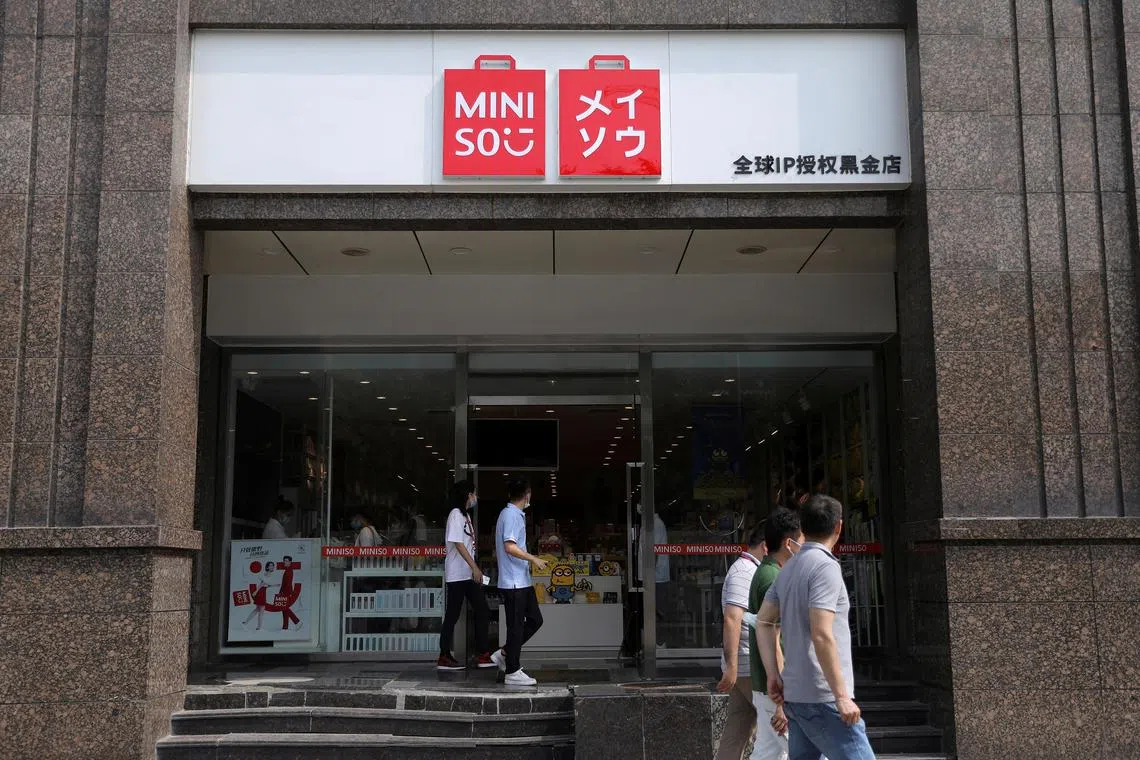Billionaire’s China supermarket deal causes swift wealth wipe-out
Sign up now: Get ST's newsletters delivered to your inbox

Miniso Group Holding Ltd. is listed in New York and had revenue of 11.5 billion yuan in the year to June 2023.
PHOTO: REUTERS
Follow topic:
BEIJING - Until recently, China’s budget retail billionaire Ye Guofu had been on a roll, building his fortune as his stores proved a hit in the nation’s slowing economy.
Then his Miniso Group Holding announced a surprise bid to acquire a majority stake in struggling mega supermarket Yonghui Superstores for 6.27 billion yuan (S$1.15 billion).
Mr Ye’s fortune tumbled US$593 million (S$761.6 million), according to the Bloomberg Billionaires Index, after the move spooked investors and sent its New York-listed stock down a record 17 per cent on Sept 23, and a further 2.3 per cent on Sept 24.
That came even as markets in China and Hong Kong soared on massive stimulus announced by Chinese officials.
“The Chinese economy and the Chinese consumer aren’t exactly on the front foot,” said Mr Neil Saunders, an analyst at GlobalData. “So I think there are just a lot of doubts swirling about exactly how they’re going to generate a return over this.”
That left Mr Ye, 46, with a net worth of US$2.9 billion, a roughly US$4 billion drop from his peak in February 2021. Back then, owners of budget stores in Asia like Mr Ye amassed billions of dollars in wealth as customers looking for bargains flocked to their stores.
The majority of his fortune comes from his stake in Miniso, a retail chain that sells low-cost household goods and electronic gadgets. The Guangzhou-based company is listed in New York and had revenue of 11.5 billion yuan in the year to June 2023.
Mr Ye’s first name means “rich” in Mandarin. He became inspired by budget shops in Japan during a business trip and brought the concept to China, enlisting Japanese designer Miyake Junya to help. The company started trading in New York through an initial public offering in October 2020 and since then has been expanding rapidly overseas.
Consumers have flocked to Miniso for its affordable, well-designed daily necessities – from stationery and kitchenware to dolls and snacks. The brand caused a stir in September on Chinese social media after photos showed American rapper Ye, formerly known as Kanye West, taking his children to a Miniso store while in the country for a performance in southern Hainan.
The latest support measures unveiled by the Chinese authorities included interest rate cuts, more cash for banks, bigger incentives to buy homes and plans to consider a stock stabilisation fund. However, the efforts may buy China only some time given the scale of challenges facing the economy.
Mr Ye’s loss is another billionaire’s gain. Miniso said on Sept 23 that it will acquire a 29.4 per cent stake from Yonghui’s existing main shareholders, including two units of Chinese e-commerce giant JD.com.
That, together with the government’s stimulus for the stock markets, sent JD.com’s New York shares up 14 per cent on Sept 24, adding US$389 million to billionaire chairman Richard Liu’s wealth. BLOOMBERG

